Lok Ping Ng Brings God’s Love into the Food Bank

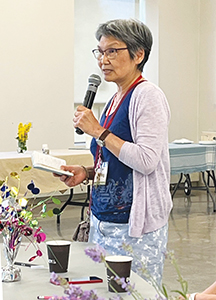
The number of people seeking help from the 105 Gibson Centre Food Bank continues to rise, with an average of about 100 cases each week. But their mission goes far beyond food assistance—it’s about sharing God’s love and offering holistic care to families, addressing physical, emotional, and spiritual needs.
Over the past decade, she has witnessed a shift in the demographics served by the food bank. She recalls,
“Back when I was serving in the downtown area, most of the people we helped were marginalized Indigenous individuals and refugees from El Salvador. Now, at the 105 Gibson Food Bank, our main clients are people with disabilities who rely on long-term government assistance, as well as refugees from around the world.”
She’s noticed a pattern: whenever a major global crisis occurs, refugees from that region tend to arrive at the food bank about eight months later. Eight years ago, they welcomed their first group of Syrian refugees, which led to the expansion of related ministries. In recent years, refugees from Afghanistan, Ukraine, and Iran have also come seeking help.
Most people discover the 105 Gibson Food Bank through Google searches or the 211 helpline. Others are referred by government agencies or school social workers. Word of mouth within the community has proven especially effective. For example, within the Ukrainian community, once a few families received assistance, they actively spread the word to newcomers and guided them to the food bank.
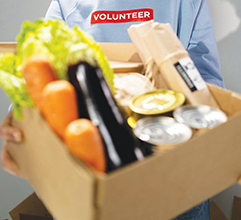
“On one hand, we appeal to the community for donations; on the other, we receive supplies from The Food Bank of York Region. They operate a fleet of large refrigerated trucks that collect food from major suppliers and supermarkets—items nearing expiry or unsellable—and distribute them to smaller food banks. Churches and other organizations also contribute, donating fresh meat, vegetables, and canned goods. If we receive financial support, we purchase needed food from designated suppliers at wholesale prices.”
She emphasized that each food box is carefully tailored to meet the specific needs of each family.
“Before distribution, we schedule an appointment to understand the number of family members, their background, culture, and any special requirements. Then our staff thoughtfully pack the boxes. These personalized food boxes carry more than just food—they carry love and care.”
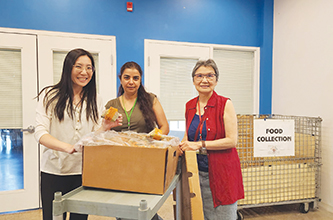
Isa Lee (left), Juliana (center),
and Mrs. Lok Ping Ng (right).
Jenny later joined another organization and became a full-time settlement worker, beginning a new chapter in her life. The food bank also hired a Sudanese staff member who spoke Arabic; she eventually became an assistant manager at a pharmacy. Another example is Angela, a Colombian woman who was originally a recipient of the food bank’s services and was later hired as an employee. Mrs. Ng firmly believes that a person’s first job in Canada carries deep significance—it not only supports the family financially but also marks the beginning of integration into society. Today, Angela and her husband lead a Spanish-speaking church.
These stories show that the food bank offers more than nourishment—it can become a turning point in the lives of refugees, helping them find a sense of belonging.
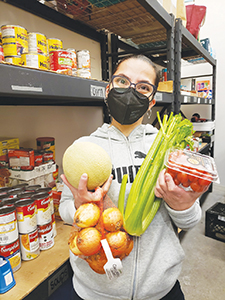
Fresh ingredients are
the most popular
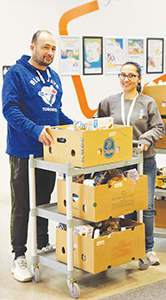
Angela, a ministry coworker,
welcomed a beneficiary from
Central and South America.
“We have a female staff member dedicated to Arabic-language outreach. She launched a ministry called Friendship Kitchen, where cooking and gatherings help build friendships with female refugees. Over time, this has opened doors to share the Christian faith, and we’re beginning to see the fruits of that work.”
She noted that many refugees were professionals in their home countries, but due to unrecognized credentials and language barriers, they struggle to establish themselves in Canada.
“They need more than material assistance—they require deep emotional and spiritual support and companionship.”
Currently, the challenges they face far exceed what the food bank alone can handle. Mrs. Ng expressed her concern:
“The cost of living is extremely high. Even a small room in a shared unit—with communal bathroom and kitchen—costs $700. Renting a basement ranges from $1,500 to $2,500. No matter how hard those receiving food bank support work, most of their income is swallowed up by rent. As for government aid, it’s barely enough to survive. A single person can receive up to $700 a month, and a family only about $1,200—which isn’t even enough to cover basic rent.”
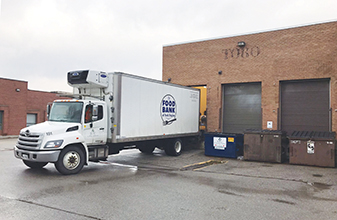
Food delivery truck
“A single mother in her fifties was caring alone for her two adult children, both suffering from serious illnesses. Her son had a rare disease, and her daughter had a congenital heart condition along with intestinal tumors, requiring multiple surgeries. Although they received medical follow-up, life remained extremely difficult. The mother couldn’t work due to her full-time caregiving responsibilities and survived on just $1,400 a month in welfare support—barely enough to get by. She herself had diabetes and declining kidney function, and was later diagnosed with cancer. When the food bank learned that she had access to medication but couldn’t afford insulin injections, we stepped in to cover the cost. Later, she had to undergo dialysis and other treatments.”
“Despite everything, she gratefully said, ‘Whenever I need help, God sends angels to help me.’”
Her landlord’s daughter, a family doctor, provided medical assistance. She also met a nurse at the hospital whose lawyer husband helped apply for Ontario Disability Support Program (ODSP) benefits for her two ill children.
Witnessing this mother’s resilience through immense hardship—never bitter, always thankful, and full of faith in God— Mrs. Ng was deeply moved. It became a powerful source of encouragement and reflection for her.
“You are not alone—there are people here who care about you.”
This, Mrs. Ng said, reflects the deeper meaning she’s discovered through years of service. The work of the food bank is not merely about providing food—it’s about sharing God’s love and offering holistic care to families: physical, emotional, and spiritual. Helena
Helena





